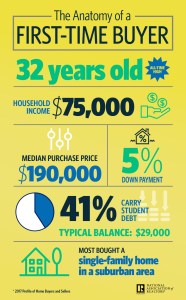
If you’re thinking of buying your first home, or have already started the process, take note. First time home buyers tend to overpay when buying a home. This is the conclusion of a study recently published in the Journal of Real Estate Research (Under What Circumstances do First-time Homebuyers Overpay? – An Empirical Analysis Using Mortgage and Appraisal Data; 2019). Although the stunning claim of overpaying first-time homebuyers is worthy of discussion, there’s more to the story than what’s implied.
Considering housing affordability, authors Jessica Shui and Shriya Murthy tested their hypothesis that first-time homebuyers tend to overpay for their homes compared to repeat home buyers. Their conclusions indicate that the overpayment is a little more than one percent. It doesn’t sound like much, but the overpayment could be a little more than $3,500 on a $350,000 home purchase. In addition to discussing overpayment, they found that first-time homebuyers typically buy smaller homes with less amenities (which is not a surprise).
Are home prices increased because of seller closing cost assistance? Many first-time homebuyers lack cash and savings and typically ask for seller closing cost assistance. For most first-time homebuyer purchases, the seller credit is already “baked” into the list price. Anticipating that the buyer will ask for a closing assistance, the home seller typically will increase their asking price from the outset. However, some home sale prices are negotiated upward to add seller closing assistance to the list price.
Although Shui and Murthy imply that first-time homebuyers are less savvy than their counterparts, they look toward appraisals as the cause and the solution. Their results indicate that a majority of first-time homebuyer appraisals provide valuations at contract price, and suggest that appraisers are somewhat “biased” to help the house appraise. Their solution is for appraisers to be neutral, which they believe would mitigate inflated home prices and help first-time homebuyers renegotiate the contract price.
Although the study takes a circuitous route to the conclusion, the premise and statistics are presented to make it sound as if appraisers are at fault for overpaying first-time homebuyers . However, if this is your first home purchase, there are many more factors to consider.
Take for instance the buyer agent. Research has demonstrated that most buyer agents don’t act in the best interest of their clients. Most notable is the research that indicates that seller-paid buyer agent commissions actually increase home sale price (which I cited last week). When hiring a buyer agent, you should take into account how they view their fiduciary responsibility. Don’t assume the list price is reasonable. Have your buyer agent provide unbiased comparables to formulate an offer and negotiating strategy.
Although you have the right to choose your lender and title company (among other real estate professionals), you may be steered toward a professional affiliated with your buyer broker/agent. Before deciding, compare costs and ask for references. (Knowing your rights as a real estate consumer is crucial, see: https://dankrell.com/blog/2014/02/27/respa-empowers-home-buyers-and-consumers/)
Overpaying first-time homebuyers is not just about home sale price. There are other areas where you may not negotiate well. The home inspection is one of those issues, and can also reveal that the home is need of repair. You probably would like to negotiate repairs to be completed by licensed contractors. Sometimes, the seller will offer a credit in lieu of making repairs. Before accepting the credit, make certain the amount is adequate by checking with your licensed contractor.
Finally, understand that buying your first home is emotional. Don’t fall prey to agent sales tactics. Stay focused on the facts and use the data to help you formulate your offer to negotiate the best price.
Original located at https://dankrell.com/blog/2019/06/03/overpaying-first-time-homebuyers
By Dan Krell
Copyright © 2019
If you like this post, do not copy; instead please:
link to the article
like it on facebook
or re-tweet.

Disclaimer. This article is not intended to provide nor should it be relied upon for legal and financial advice. Readers should not rely solely on the information contained herein, as it does not purport to be comprehensive or render specific advice. Readers should consult with an attorney regarding local real estate laws and customs as they vary by state and jurisdiction. Using this article without permission is a violation of copyright laws.




